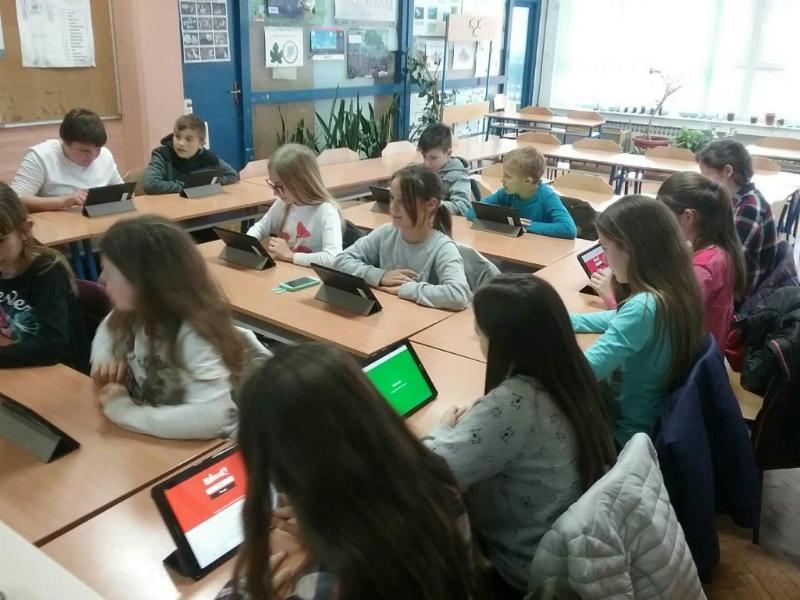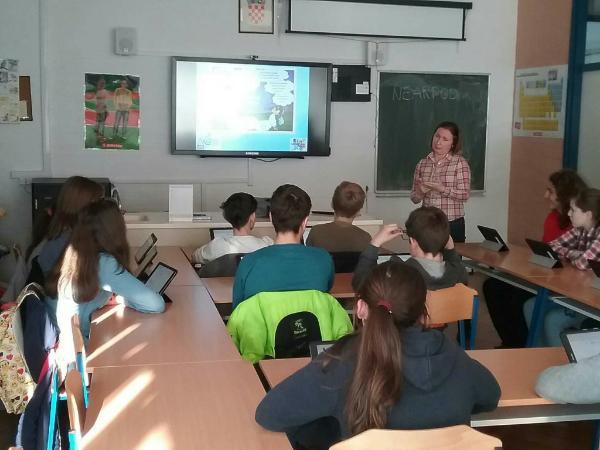With the European Union’s support for Croatia digital education, more than 1 300 schools, 20 000 teachers and 455 000 students usher in a new era of online learning
When schools all over the world closed in March 2020, Ivana Mažar Marušić, a teacher at Dragutin Tadijanovic Primary School in Vukovar, Croatia, was just one of millions of educators who had to adapt quickly. But unlike many others, she was ready to move her classes online. “No matter which class a teacher taught, or which grade our students attended, overnight, we had all become first graders in our new online school.”
Long before the word “lockdown” became part of our daily vocabulary, Croatia had started working on bringing its schools into the digital age. Ivana’s school was chosen as one of 151 participants in the pilot phase of a nationwide digitalisation project led by CARNET, the Croatian National Research and Education Network. 920 teachers and over 6 000 students in these schools were provided with laptops, tablets and presentation equipment, as well as better connectivity. “Thanks to the equipment and the training the teachers had received, we were ready for online classes within two days from when the school closed,” Ivana says.
Going digital
The pilot phase was followed by the launch of the second stage of the project in 2018. The plan is to fully digitalise more than 1 300 primary, secondary and art schools in Croatia by the end of 2023. On top of that, more than 20 000 teachers and other educational staff will undergo various trainings. The aim is to not only provide all Croatian schools with IT equipment, but also to educate the teachers, as well as create digital educational content, thus raising the digital maturity level of Croatian schools.

The European Union has funded both stages of the project, which has been recognised with a Regiostars Award from the European Commission for the best cohesion policy projects in the field of “Skills & education for a digital Europe”. The second stage alone received over €150 million from the European Regional Development Fund and the European Social Fund. And the European Investment Bank has been involved since the very beginning. Our JASPERS team, which advises public authorities and promoters on strategies, programmes and projects to help them make use of European funds, ensured this project saw the light of day.
Innovation is not just technology
“We have assisted CARNET from the moment the country decided to start with the pilot phase to figure out the best way to take the project nationwide,” says Joanna Knast-Braczkowska, an economist at the European Investment Bank who worked on the project.
This decision proved the right way to go. Compared to the initial evaluation, 93% of the schools participating in the pilot phase increased the level of their digital maturity, reaching the level of digitally competent or digitally advanced schools.
What is the digital maturity of schools?
- Have a high level of integration of information and communications technology (ICT) in their educational offer and in the administration of the schools
- Systematically approach the development of the digital competencies of the staff and students
- Have adequate ICT equipment for classrooms, laboratories, employees and students
- Use ICT to improve teaching methods, develop digital educational content and evaluate students’ achievements

“I think one of the most important aspects of the project was the focus on the teachers’ training and the educational content, in addition to the infrastructure and the equipment. In this sense, the pilot phase provided valuable lessons that were successfully integrated in the second phase,” says Teresa Calvete, a senior European Investment Bank economist who worked on the project as well.
Teachers can use all of the digital educational content and various teaching scenarios as they deem appropriate for their own class.
And teachers are not the only ones who benefit from it. “The educational digital content is so easily available now. We can use it whenever we want,” says Ana Cicak, a high school student from Zagreb. But Ana says there is another important aspect to the content, both for the students and their parents’ wallets. “In case we don’t find part of the curriculum clear, or if we miss some classes, we don’t have to pay tutors anymore. We just use the materials available.”
The new normal
As in the rest of the world, the pandemic caused widespread disruption in the Croatian education system. Not all schools were ready when COVID-19 hit. The pandemic did, however, confirm what the project team already knew. The lockdown demonstrated the importance of digital technology in education – not just for distance learning, but also for traditional (face-to-face) learning. Many schools in Croatia have already made use of these new ways of teaching and learning.
The project will be finalised in 2023, one year later than originally planned, due to the supply chain disruptions caused by COVID-19. Once done, it will signify a new era for education in Croatia. Ivana, for one, is excited about the ‘new normal’ of using digital technology in the classroom. “Now, we all just need to ace this class,” she says.
